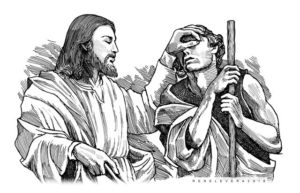In our English Lit in high school, we were required to learn John Milton’s sonnet, “On His Blindness,” by heart.
I had no trouble memorizing it, being short and simple. And the sonnet’s famous last line has stayed with me —”They also serve who only stand and wait.” (Unfortunately, many people take this out of context to justify their laziness.)
In the sonnet, Milton mentioned his one talent which he considered “death to hide.” No doubt he was alluding to the Parable of the Talents in the Gospels, in which the servant who received a talent (a silver coin of great value) was thrown into the darkness for hiding it in the ground instead of investing and profiting from it, like the others.
Some take Milton’s talent as his gift of poetry, others as his considerable skills as a foreign language translator.
Whatever it was, his blindness had made it impossible for him to use the gift.
How would he make an accounting of it to his Maker, he asked.
Did God still expect him to continue with his literary pursuits despite his blindness?
(“Doth God exact day-labour, light denied?”)
To which, in his patient waiting, he finally found the answer — God does not really need man’s work or gifts, and asks only that man “bear his mild yoke”— in other words, joyfully accept the circumstances of his life.
Because God, being kingly and powerful, can, if he chooses, send thousands over land and sea to do his bidding without cease.
Hence, the disabled, who cannot stand or see and do anything but wait, for as long they accept their disability and surrender themselves with love to God’s will, do render an equally good, if not a better service.
The blind Milton reminds me of another blind man, Bartimaeus, who, Mark writes in his Gospel, shouted after Jesus, who was leaving Jericho followed by his disciples and a big group of people, “Jesus, son of David, have pity on me.”
He continued to shout despite being told to shut up by an exasperated crowd, until Jesus had him called and directly asked him.
“What do you want me to do for you?”
“Master, I want to see,” the blind man said.
Jesus replied, “Go your way, your faith has saved you.”
Mark writes, “Immediately he received his sight and followed him on his way.”
Milton complained to God that he could not continue with his usual writing because of his blindness.
But through his humility and patience, his vision was restored, not the physical kind but the spiritual — the grace to see that what God really required of him was a joyful acceptance of his will.
Bartimaeus, on the other hand, directly prayed for the return of his physical vision, which Jesus graciously granted.
Perhaps, on top of the physical, he received the spiritual as well, because, as Mark tells us, he followed Jesus on his way.
The first, the physical, he might lose again, by reason of age, injury or disease, but the second, the spiritual, for as long as he kept Christ within sight, never.
Disclaimer: The comments uploaded on this site do not necessarily represent or reflect the views of management and owner of Cebudailynews. We reserve the right to exclude comments that we deem to be inconsistent with our editorial standards.

